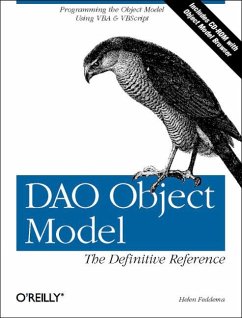Each iteration of Windows has meant a corresponding improvement in the techniques used for transferring data among its applications. Today's leading technique is called Automation. It allows you to work directly with objects in an application's interface using their object models. But if you want to write code in a programming language, such as Visual Basic, in order to work with the apps that support Automation, you must understand the inner workings of an application's object model--or in the case of Microsoft's Access, its two object models. Microsoft Access is the bestselling stand-alone relational database program for Windows offering both power and ease of use. And in many respects, Microsoft has made Automation the centerpiece of its vision for application development. DAO Object Model: The Definitive Reference will guide you through the Access object models, allowing you, with the support of Automation, to reference the application components you want to manipulate. An understanding of the object models is essential for developers who work with data in Access tables, or who want to manipulate components of the Access interface from other Office apps. The Data Access Objects (DAO) model is used to write and read data in Access tables. The Access object model is used to manipulate forms, reports, queries, macros, and other components of the Access interface, including most of the commands by means of the DoCmd object. This book will include an introduction and a brief description of the differences between VBA (used in most Office applications) and VBScript (used in Outlook). This chapter will also cover Office utilities and add-ons helpful in writing and debugging code, such as the Object Browser, the Integrated Development Environment (IDE) for VBA and the Interactive Debugger for VBScript. The book will then be divided into two parts; one covering the Access Object Model and the other, the Data Access Objects. Each section will have a description of what the object represents; listings of properties, events, and methods; and one or more code samples illustrating its use in VBA and/or VBScript code. Each property, event, or method section will have an explanation of the language element, and many will have code samples (either VBA or VBScript) as well. This book will detail, to an advanced user or keen intermediate user, the Access object models and how they are used. It will be the reference guide VB developers reach for when working with data in Access tables, or for manipulating components of the Access interface from other Office applications.
Bitte wählen Sie Ihr Anliegen aus.
Rechnungen
Retourenschein anfordern
Bestellstatus
Storno

